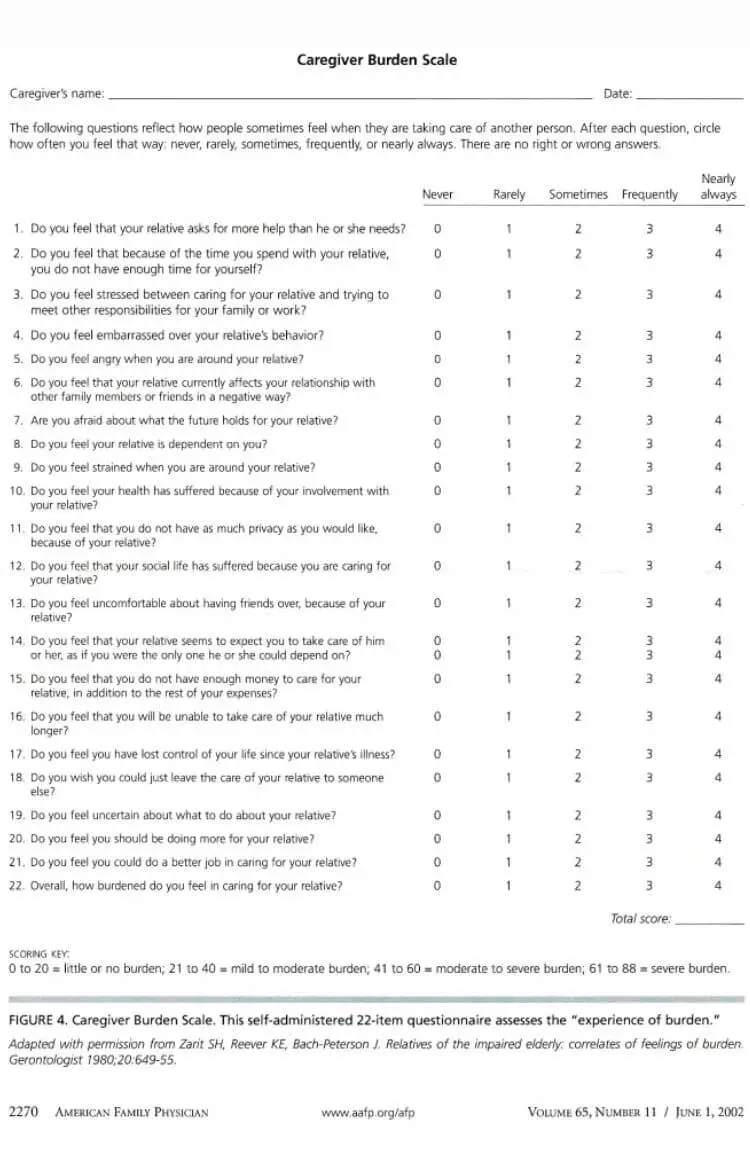17 Symptoms of caregiver stress: preventing caregiver burnout.
The 17 symptoms of caregiver stress.
Taking care of your loved one is a very fulfilling and selfless job but it can also make you feel stressed and hopeless. In order to avoid it, you need to know what are the symptoms of caregiver stress.
Witnessing the decline of your partner’s health can be painful and almost certainly leave a psychological mark.
This article is going to help you identify the stress you are going to face as a caregiver.
Here is the answer with 17 symptoms of caregiver stress:
- Grief.
- Anger.
- Denial.
- Irritability.
- Feeling sad.
- Feeling alone.
- Feeling fed-up.
- Feeling resentful.
- Feeling exhausted.
- Feeling overwhelmed.
- Feeling constantly worried.
- Neglecting responsibilities.
- Gaining or losing weight.
- Anxiety about the future.
- Having sleepless nights.
- Feeling often very tired.
- Lack of concentration.
I experienced these symptoms of caregiver stress first-hand when taking care of my wife who suffers from endometriosis and fibromyalgia.
At the time I didn’t recognize the burnout that nearly got me.
What helped was the caregiver burden scale, which I found by chance. I provide you with the caregiver burden scale in a pdf version below.
As always, this is totally FREE, you deserve it!

Difficult feelings…
Analyzing my own emotions wasn’t easy because how can you feel resentment towards someone you dearly love and care for?
How can you feel anger when you don’t really feel that way towards them?
And how can you deny your own struggles when you feel them while caregiving for your spouse?
The answer to that question is simple.
These are temporary emotions that are a natural response to exhaustion.
We all have only so much patience and every person has a breaking point.
When you’re caregiving for your second half, it is difficult to keep your emotions inside without letting them out.
But we do, we accumulate these emotions over and over not to hurt our partners, and that becomes overwhelming.
It becomes overwhelming to the point we break. Our feelings take over.
What can you do in such a situation?
You must always remember not to make any permanent decisions for your temporary emotions.
That’s the simplicity of it, the realization that our feelings don’t last.
They don’t last, however, we still fall for them, and the guilt and regret usually follow these feelings.
We don’t really feel negative emotions towards our beloved partner. But when caregiving becomes too much, we do, and it’s really hard to accept them.
Symptoms of caregiver stress.
Providing care to someone quite often means committing a lot of your physical and emotional energy to your partner.
That means, you end up neglecting your needs and exhausting yourself to the point of stress, and eventually burnout.
It is totally understandable for you to suck it up and to fully commit to them.
But in the long run, if you overwork yourself, not only will it damage your own wellbeing, but prevent you from giving effective care to your spouse.
There is something though, that will enable you to maintain a healthy life while you fulfill your role as a caregiver.
Here are 17 symptoms of caregiver stress you should know in order to prevent caregiver burnout…
Grief.
One of the first symptoms of caregiver stress is grief. I felt a lot of grief over the life we both used to have. M and I were both professionally dancing and performing.
Today, we do it part-time since my wife was diagnosed with endometriosis and fibromyalgia.
I also cut on my passion for gym workouts from 7 days a week to 1.
Not only that – my wife needs my psychological support and she feels lonely when I’m at work.
I work full-time and when I come home every evening, sure I want to be with my wife, but sometimes I just need a break.
Sometimes I just want to come home and blog. I love blogging. This is my biggest passion so far and I want it to become my full-time job.
I’m a hard-working man. I would gladly come home after work and work an extra 6 to 8 hours on my blog every day.
I cannot do this. My wife doesn’t go out to see friends. She relies on my company. I cannot blog until she goes to sleep.
Only then I won’t feel guilty.
But what about me? I feel grief over my “lost freedom”.
Anger.
The second of most common symptoms of caregiver stress is anger. There are countless emotions involved in caring for a chronically ill loved one, I point out only 17 of them.
Difficult feelings like anger are a common symptom of caregiver stress that you will often struggle with.
Each person experiences and handles powerful anger emotions differently.
I’m an optimist. To get me angry you need to work hard, however, there are times when even I feel it is too much.
Where one family caregiver may frequently experience annoyance without being angry about it, another one may get frustrated and immediately feel outraged!
When anger becomes a problem, it can impact your quality of life and even your relationship.
Denial.
I denied it many times. I still do.
I try to hide my own emotions behind my optimistic mask. My wife knows I’m a positive soul, it’s easy for me to hide what I feel.
But it isn’t even about hiding. I can deny my negative feelings at any moment when she asks. Why?
Because she has a lot on her plate to deal with.
She has endometriosis and fibromyalgia. They caused her to develop anxiety, Obsessive-Compulsive Disorder, and depression.
The last thing I want is to overwhelm her with my own problems and emotions. She has a lot to deal with already.
So I keep my emotions inside, but as you can see, I let them out in writing.
My blog helps to relieve the pressure that normally would build inside.

Irritability!
I don’t easily get irritated but there are times when you feel like bursting, especially when your loved one has OCD.
Since you don’t have Obsessive-Compulsive Disorder, no matter how understanding you are, eventually patience reaches its limits.
You are expected to be understanding, patient and caring. But no one ever takes your point of view into account.
Why is it always one way?
The very fact that you don’t suffer from it should give your partner a clue that you can get irritated.
You can only take so much…
You may easily get irritated if the person you love and support doesn’t understand what you are going through.
Chronic illness affects both people in the relationship, not only one.
People seem to forget that.
Feeling sad.
When it comes to sadness, every day you confront some change or loss. This is another of the symptoms of caregiver stress.
Sadness is bound to happen, and if it won’t let go, you might get depressed.
If you feel constantly sad or/and negative, you should get help right away.
What you can do is contact your doctor or find a private therapist if the waiting list is too long.
Additionally, the best way to avoid sadness is by exercising and attending social activities. These are great ways to handle sadness and even depression.
Although they don’t fix the issue, they give you stress relief, a better mood, and a connection with people.
Feeling alone…
Feeling alone comes back again to the lack of understanding from others.
Your world can shrink before you realize what’s happened.
If you’re dealing with someone chronically ill who doesn’t have the energy to share time with you, the feeling of isolation is only natural.
Loneliness seems to take your willpower and the ability to cope, let alone care for somebody else.
You may even fall into the trap of overeating, smoking, or alcoholism.
Lonely people also have more cortisol – the stress hormone.

Feeling fed-up!
Caring for a loved one strains even the most resilient people. It isn’t easy.
Each day, you face new challenges and help over and over again. Being a caregiver is hard work, and it is impossible to keep a level head at all times.
I also care for a boy with cerebral palsy. He’s lovely but needy. I mean, NEEDY!
He likes to joke and play pranks on me, and wiggles in his bed, which puts him at risk of falling out of bed. He twists his head until his tracheostomy tube beds and blocks.
That makes him stop breathing.
It isn’t his fault, it’s the condition. However, after 12 hours of constant struggles with him, my shift is over.
I go home with the hope of a relaxing evening. Not always I have that luxury.
My lovely wife also needs help sometimes, and gladly I would stay home to be only with her. It isn’t possible.
There are times when I simply feel fed up because I rarely have time for myself and this is so overwhelming…
Feeling resentful.
Caregiver resentment is a feeling of unfairness or irritation. So far we experienced both.
For many caring family members, caring can bring a sense of resentment toward a situation, it isn’t necessarily towards the person because we must remember, it isn’t our partner’s fault they are ill.
We love helping our loved ones. It is a good feeling to comfort and give aid to someone in need, especially someone you love.
But this support can also take a toll on you. There is a great responsibility and at times a burden that can be felt by you as the caregiver.
Feeling exhausted…
Talking about symptoms of caregiver stress, exhaustion is pretty common. Feeling exhausted may also be seen as caregiver fatigue or caregiver burnout which we are trying to avoid.
It occurs when you feel emotionally and physically exhausted. This often leads to a change in attitude.
Negative feelings towards your tasks and the person you care for can often be extremely tiring. However, you feel that you have to keep going.
When you focus all of your effort and energy on caring for your loved one and neglect to take care of yourself, your health suffers.
Neglecting your own mental and physical health and allowing long-term stress can result in exhaustion.
Feeling overwhelmed.
When you suffer from caregiver stress, you may find that other areas of your life suffer too.
As you push yourself more into helping the loved one you care for, your career, social connections, and sense of identity can begin to fade away.
The overwhelming responsibility of a family caregiver can cause physical and psychological conditions as well.
That includes a stress-related feeling of being overwhelmed.
If you feel like you can’t keep up, you may be suffering from caregiver stress. While every next task becomes overwhelming, if it becomes too much you will have to stop to take care of yourself.
Caregiving for someone can easily lead to feelings of overwhelm – sometimes it’s simply too much!

Feeling constantly worried.
Whenever you are at work and your partner stays at home, you may feel constantly worried about that person.
Especially when your loved one is in a similar position to my wife.
MY wife was first diagnosed with stage IV deep infiltrating endometriosis. The shock from the diagnosis, both – physical and emotional, brought upon her another chronic disorder – fibromyalgia.
Both drastically restrict her from living life on her terms.
Aside from whole-bodied chronic pain, fatigue, brain fog, and anemia, my wife suffers from anxiety, OCD, and depression.
Chronic physical conditions always have an impact on mental health.
At the times when my M was feeling suicidal, being away from her at work, I was constantly worried, which was a natural response and one of the symptoms of caregiver stress.
Naturally, I took plenty of time off, but as you can imagine, I began to worry about my job and our finances.
You see, either way, I had no escape from worrying.
Neglecting responsibilities.
In order to cope, sometimes you may neglect responsibilities that don’t seem as important as others.
When it comes to the choices you make each day, caregiving clearly takes priority over your own needs and responsibilities.
You would never willingly choose to help only one member of your family. Especially if it meant that another family member would unnecessarily suffer.
But you’re doing it as we speak!
Don’t put yourself in the position of the neglected sufferer.
Whilst learning about caregiving first-hand I experienced many of the symptoms of caregiver stress and realized that caregiving is about caring for every family member and that includes YOU, my friend!
I don’t think there is anything to add…
Gaining or losing weight.
Taking care of both – the boy at my full-time work, and my wife at home when she needs me, made my gym regime fade away…
What followed was the neglect of a healthy diet.
Firstly, I felt too busy to eat enough and I began to lose weight. Today, I am in no shape or form obese, but for my standards, I am not happy with myself.
I put on a bit of weight but the weight isn’t healthy, as most of the time I eat crap food, because time doesn’t allow me to sit and cook.
There are about 45 million people who provide unpaid care to family members every month.
A vast 75% of those caregivers are women. Most of them experience high amounts of stress. In fact, approximately 90% of female caregivers say stress has the most impact on their lives and on their health.
During times of high stress, cortisol (stress hormone) levels rise in your body.
For caregivers, high stress affects them daily. The level of stress we regularly encounter is astonishing!
As the levels of cortisol rise, it causes increased levels of insulin. This makes your blood sugar drop and we crave a piece of the pie.
Anxiety about the future.
Family members providing care at home for a loved one with a serious illness grow in number fast!
We often provide countless hours of direct or indirect care and support for our loved ones.
Some partners who suffer from multimorbidity can’t work. That puts a financial strain and anxiety about the future.
Balancing your own responsibilities and coping with caring for a loved one’s illness can often feel very overwhelming.
This is why for caregivers to feel anxious is pretty common.
Anxiety is a strong feeling of worry or fear. While it is normal to feel like you have a lot to do, anxiety can sometimes get in the way of you living your daily life and caring for your chronically ill partner.
Having sleepless nights…
When my wife wakes up, I wake up too, she needs a bottle of water, I go downstairs to bring it to her. She has more needs, I help her out.
That’s just the way it goes. I cannot imagine her doing it all by herself.
Sleepless nights are also called “insomnia”.
Insomnia is a sleep disorder characterized by no sleep, little sleep, or poor sleep. It may be chronic or temporary.
Insomnia can be caused by a variety of factors but caregivers like you and me experience high levels of stress and anxiety, which in return, leads to insomnia.
Without proper treatment, insomnia not only leads to exhaustion and irritability, but it may also develop into chronic fatigue syndrome or severe depression.
With a regular bedtime routine and relaxation techniques, you can overcome such a state.
Feeling often very tired.
You may feel tired because of insomnia, that would be the primary reason.
Feeling tired can be mentally and physically exhausting.
It usually occurs if you aren’t taking care of your own needs as well as the needs of your loved one.
The solution here is simple – practice self-care!
Lack of concentration.
When you feel tired and overwhelmed, the first thing on your mind would be to rest.
However, the demands of your support don’t allow you to take care of yourself and make you lose often focus and concentration.
You have no energy, you need to stop and ask for help. The minimum you should do is rest and sleep.
If you lack concentration and focus, you will most likely miss important tasks such as giving medication or forgetting something important from the shop.
In some cases, when giving medication, if you’re not focused, you are going to make mistakes, which can in the worst scenario harm the loved one you care for.
Rest and ask for help, eat well, and rest even more. Take breaks more often too.
Conclusion!
Taking care of your loved one is very fulfilling and selfless on your part, but there will be times when you feel angry, resentful, tired, and often forgotten.
You need to take care of yourself before taking care of your chronically ill partner.
I hope these 17 symptoms of caregiver stress will help you prevent caregiver burnout.
All the very best!


About Me
Hi, I’m Lucjan! The reason why I decided to create this blog was my beautiful wife, who experienced a lot of pain in life, but also the lack of information about endometriosis and fibromyalgia for men…
